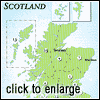
|
The Scottish Wars of Independence Continued from Page One
So, Balliol was crowned in 1292, and was faced with constant pressure from Edward to acknowledge him as his overlord. To Balliol's credit he refused to do so. In 1295, Edward gave the Scots an ultimatum. He wanted every man of rank to attend him on his forthcoming invasion of France. This was one step too far and the Scots instead signed a treaty of mutual aid with France. In consequence, Edward invaded Scotland instead.
The invasion of 1296 saw the beginning of the Wars of Independence. Scotland would now be in almost constant conflict with England for the next 300 years. To put this in perspective it should be understood that the two nations had been on fairly friendly terms for the preceding century. Even when there was conflict it was fairly low key.
Edward began his invasion at Berwick. The town was besieged and after a short struggle, the town was sacked and the inhabitants put to the sword, literally. A group of Flemish merchants were burnt to death in their guild hall on the express orders of Edward. The numbers of dead caused severe problems and they were ordered to be thrown into the sea, or into deep pits. The English army stayed at Berwick while a probing force was sent towards Dunbar. There they routed the main Scottish army, back from raiding the north of England.
After the defeat of the Scottish army, Edward went on a progress through Scotland. On the way, he took the Scottish piece of the true cross, the black rood, the Stone of Destiny (or at least what he was told was the stone!) and stripped Balliol of his heraldic arms. Having thus secured Scotland, he went south again.
Having subjugated Scotland, Edward now demanded that all nobles and landholders swear fealty to him at either Berwick or to their local justiciar or Sheriff. The names of all those who took this oath were then put on a list, this list is now known as the Ragman Rolls. One notable exception to this was the son of a Lanarkshire knight named Malcolm Wallace and his brother William.
Links: Famous Scot: Alexander III on GOTC Famous Scot: Robert the Bruce on GOTC Robert the Bruce's Heart on GOTC Robert the Bruce Murders John Comyn on GOTC Famous Scot: William Wallace on GOTC |
Thursday, December 26th, 2019
Attention visitors: Tartans.com is back. Please note that this is a snapshot of the site as it existed nearly 20 years ago and you may encounter broken links; we are still combing through the site and correcting those as we find them. Please also note that some sections are currently not functional, primarily the discussion forums/clan chat boards.
|
** HOME - First Time Visitors - Glossary - - Contact Us ** Awards | Bibliography | Clan Calendar | Clan Chat | Clan Finder | History | Famous Scots | Genealogy | Great Hall of the Clans | Links | News and Features | Scots on the Net | Search | Site Map The Gathering of the Clans
Copyright 1995- Tartans.com - All Rights Reserved. |

